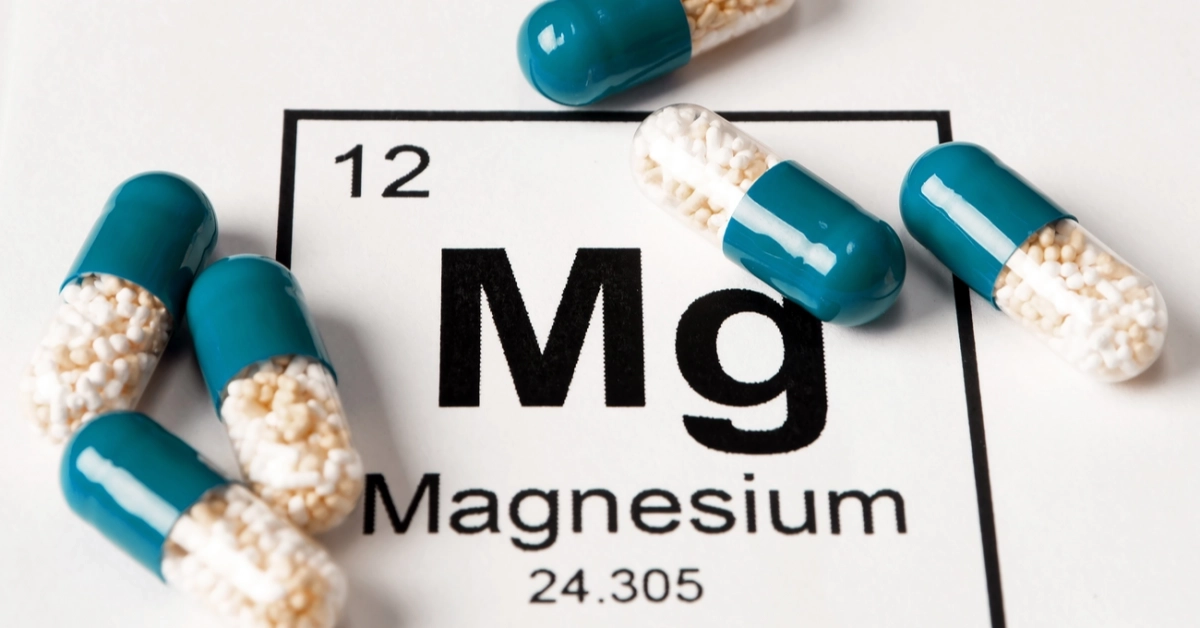There’s a lot of talk in the world of health & wellness about improving your intake of essential nutrients, vitamins, and minerals, but one essential mineral that needs to be talked about more is magnesium. Magnesium is essentially akin to the Swiss Army Knife of minerals, as it’s been linked to alleviating the symptoms of a myriad of health conditions like:
- Bone health issues
- Energy deficiency
- Anxiety
- Nerve function
- Cardiovascular issues
Like Vitamin D and iron, magnesium is an essential component that goes a long way toward improving homeostasis and equanimity in the body, whether you’re striving to improve your physical or mental wellbeing.
Unfortunately, almost 1/3rd of adults worldwide (or 30%, according to The Lanby) fail to meet the adequate daily recommended magnesium intake, and around 50% of Americans fail to meet their adequate recommended magnesium intake. A lot more people probably aren’t familiar with the recommended daily magnesium intake figures according to the National Institutes of Health (400-420mg for most men, and 310-320mg for most women).
How can you tell if you’re getting enough magnesium and if you’re not, what are some great foods and supplements for improving your intake? Here’s what you should know.
Magnesium Deficiency Symptoms
Here are some health conditions, concerns, and symptoms that can be indicative of telling signs of magnesium deficiency:
- Muscle cramps: Experts (like those with research on PubMed) have linked magnesium deficiency to muscle cramps, spasms, twitching, and in really extreme cases, even seizures and convulsions.
- Depression: A study published in the Internal Medicine Journal linked magnesium deficiency to exacerbated depression, apathy, and potentially, anxiety too.
- Osteoporosis: While magnesium deficiency may not be the sole cause of bone weakness, deficiency in substances like that, Vitamin D, Vitamin K, and calcium can all be major contributing risk factors for conditions such as osteoporosis.
- Fatigue: If you feel routinely tired during the day, even on a healthy sleep schedule, then that may possibly be indicative of an inadequate magnesium intake, especially if it correlates with muscle weakness.
- High Blood Pressure: While more research could still be conducted on humans, numerous animal studies have linked magnesium deficiency with an exacerbated risk of high blood pressure and cardiovascular disease.
- Heart Arrhythmia: As magnesium deficiency has been linked to a greater risk of cardiovascular disease, it has also been linked to a greater risk of irregular heartbeat and heart function.
If you experience most (or all) of these symptoms, then you may want to consult with your primary care physician to consider whether or not your magnesium intake could be improved. Fortunately, there are plenty of great foods and supplemental options for improving your magnesium intake.
Best Foods For Magnesium Intake
Here are some delectable, delicious snack options rich in magnesium:
- Dark chocolate: 64mg of magnesium per ounce
- Avocados: 58mg of magnesium per medium avocado
- Nuts: 82mg of magnesium per ounce
- Legumes: 120mg of magnesium per ounce
- Tofu: 53mg of magnesium per 3.5 ounce serving
- Pumpkin seeds: 150mg of magnesium per 1 ounce serving
- Whole grains: 65mg of magnesium per 1 ounce serving
- Salmon: 53mg of magnesium per half a filet
- Leafy greens: 157mg of magnesium per 1 cup serving
If you’re wondering where you can get a good supplemental fill of your magnesium intake though, here’s where you should go.
Best Supplement For Magnesium Deficiency
Before you discern the best supplement for your magnesium intake, it would be helpful to have your current magnesium levels tested. Vessel Health is a great platform for ordering test kits at a fast, expedient delivery.
And for great supplements for upping your magnesium intake, we’d strongly recommend giving Rootine Vitamins a shot. Not only do they offer additional magnesium, but an additional array of essential minerals and precision multivitamins.
And (AND) if you’d like more information on more great online pharmacy recommendations, we’d strongly (STRONGLY) recommend giving our mailing list a follow.


